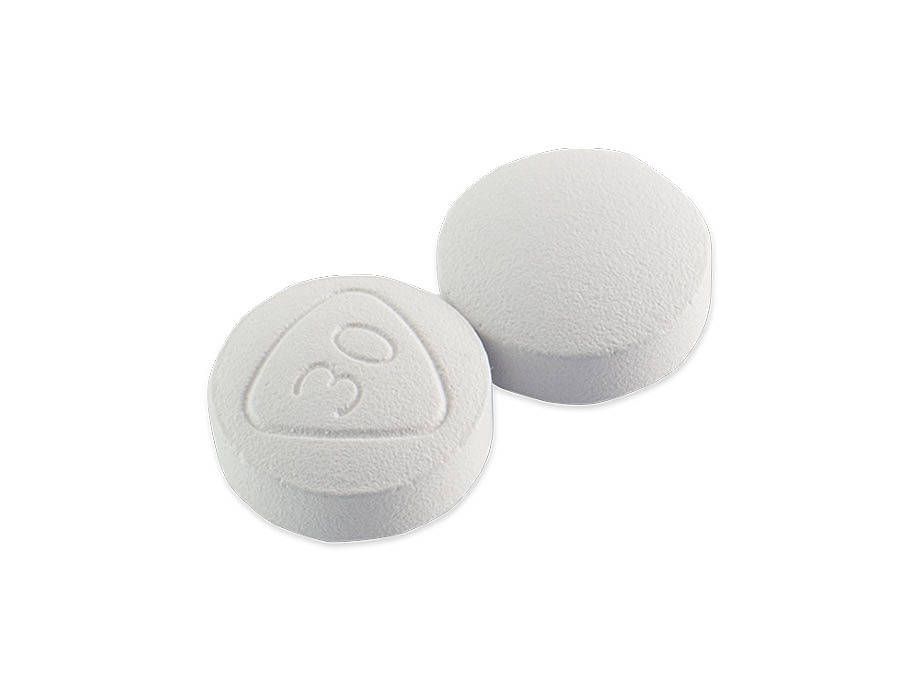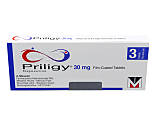Priligy (Dapoxetine)
Order a prescription for Priligy online




Priligy is a treatment for premature ejaculation which helps men to last longer during sexual intercourse. It’s a prescription-only medication and is known as a selective serotonin reuptake inhibitor (SSRI). SSRIs work by increasing serotonin levels in the brain, which can have a positive effect on our mood, emotions, and sleep. For premature ejaculation, SSRIs work by delaying the chemical reactions that cause premature ejaculation.
Simply complete our brief medical questionnaire, and a ZAVA doctor will check to see if treatment is right for you. They will then issue your prescription to a local pharmacy in Ireland or you can choose to have your medication delivered directly to your door.



About Priligy
-
-
You can order Priligy from ZAVA, and the service is quick and easy to use – just follow these simple steps:
- Fill out a short online assessment about your health and lifestyle.
- Place a request for your preferred treatment option.
- One of our doctors will check your assessment to see if your order is right for you.
- If approved, your order can then be posted to your preferred address or you can collect it from a local post office instead.
-
-
Priligy significantly improves premature ejaculation in the majority of men. In men who ejaculate in less than 2 minutes, Priligy can double or even triple their ejaculation time. This is because it increases serotonin levels, which changes the way nerve signals work, giving the brain more control over the ejaculation reflex.
The active ingredient dapoxetine works by improving the way serotonin works. Serotonin is a neurotransmitter; a chemical which is used to pass messages between nerve cells. Serotonin has a few different functions inside the human body, including sending the signals that cause ejaculation.
Priligy is licensed to treat premature ejaculation when the time between penetration and ejaculation is under 2 minutes. When prescribed to treat PE that happens between 2 and 5 minutes from penetration, this is an ‘off-label’ use.
All medications we offer are fully licensed in Ireland. Some medications, like this one, we prescribe for conditions or circumstances that are outside of the licence (also known as ‘off-label’). Prescribing ‘off-label’ is common practice by healthcare professionals to ensure a medication can safely benefit as many patients as possible. This is always based on updated information and evidence since the product first became available.
-
-
Priligy is only meant to be used by men aged 18-64. You shouldn’t take Priligy if you:
- are female
- have a history of low blood pressure or dizziness
- use recreational drugs like ecstasy, LSD, narcotics, or benzodiazepines
- drink alcohol
- have any mental health conditions
- have epilepsy
- have a history of blood clotting problems
- have kidney problems
- are at risk of high pressure in your eyes, or glaucoma
You also shouldn’t take Priligy at the same time as any of the following medications:
- monoamine oxidase inhibitors
- thioridazine
- lithium
- linezolid
- tryptophan
- St John’s Wort
- tramadol
- medications used to treat migraines
- medications used to treat depression
-
-
If it’s right for you, you can get 30 mg Priligy for premature ejaculation. Your doctor can potentially increase the dose to 60 mg if needed. Priligy is taken 1-3 hours before sex. It shouldn’t be taken more than once every 24 hours.
-
-
You should always take your medication exactly as your doctor has advised you to. If you’re not sure, get in contact with your doctor or pharmacist.
Taking Priligy:
- You should only take Priligy once a day at most.
- You must only take the dosage approved for you by a doctor. Priligy is taken orally (by mouth), with or without food.
- You should swallow your Priligy tablet whole with at least one full glass of water to reduce the chance of fainting.
- You should check in with your doctor about your treatment after 4 weeks, or 6 doses, to see if you need to carry on taking it.
- If you do continue to take Priligy you should review your treatment with your doctor every 6 months.
-
-
The active ingredient in Priligy is dapoxetine. It’s a short-acting, selective serotonin reuptake inhibitor, and it was the first treatment for premature ejaculation to be licensed for use in the UK.
-
-
- Lactose monohydrate
- Microcrystalline cellulose
- Croscarmellose sodium
- Colloidal anhydrous silica
- Magnesium stearate
- Hypromellose
- Titanium dioxide (E171)
- Triacetin
- Iron Oxide Black (E172)
- Iron Oxide Yellow (E172)
-
-
- feeling dizzy
- headache
- nausea
- feeling irritable, anxious, agitated, or restless
- pins and needles, or numbness
- sweating/hot flushes
- diarrhoea
- constipation
- flatulence
- difficulty sleeping
- feeling tired
- blocked nose
- high blood pressure
- shaking
- low libido
- blurred vision
- indigestion
- dry mouth
-
-
Uncommon side effects include:
- fainting
- feeling dizzy
- mood changes
- feeling confused, disorientated, or unable to think clearly
- slow or irregular heartbeat
- increased heart rate
- low sex drive
- problems reaching orgasm (anorgasmia)
- feeling weak or fatigued
- depression
- anxiety
- feeling hot, jittery, abnormal, or drunk
- vision problems
- feeling itchy
- cold sweats
- spinning sensation
- abnormal taste
- teeth grinding
Rare side effects include:
- feeling dizzy after being physically active
- suddenly going to sleep (narcolepsy)
- sudden bowel movements
-
-
You should avoid drinking alcohol when you’re taking Priligy. Some of the side effects of Priligy, like feeling dizzy or sleepy, can get worse if you’ve been drinking. Another effect of Priligy is fainting, and drinking alcohol can increase your risk of getting hurt if this happens.
Alcohol and recreational drugs can lead to erectile dysfunction and premature ejaculation. So, you should avoid drinking or doing drugs if you’re having premature ejaculation, even if you’re not taking any medication. We recommend you always avoid recreational drug use, and limit how much you drink.
-
-
Premature ejaculation is the most common ejaculation problem that men get. It’s defined as when a male ejaculates too quickly during sexual intercourse. The average time for ejaculation is around five-and-a-half-minutes, so ejaculating a lot faster than that could count as premature ejaculation.
The causes of premature ejaculation aren’t always clear, but it affects most men at some point in their lives. One-off episodes of premature ejaculation aren’t usually a problem. But, if you feel like it’s strongly affecting you, or that around 50% or more of the times you have sex end in premature ejaculation, treatment might be right for you.
-
-
Premature ejaculation is a common condition and can regularly affect up to 30 % of men. It’s hard to know exactly what causes it, but there are many risk factors for getting premature ejaculation.
Men who are more likely to get premature ejaculation include those who are:
- stressed
- depressed
- overweight
- consuming high amounts of alcohol
- getting erectile dysfunction
- smokers
There are 2 types of premature ejaculation:
- lifelong (primary) premature ejaculation
- acquired (secondary) premature ejaculation
Lifelong premature ejaculation happens the very first time a person has sex and happens every time afterwards as well. On the other hand, acquired premature ejaculation may not happen all the time and is often caused by psychological factors such as stress and depression.
Relationships can also be a cause of premature ejaculation. For example, if a relationship is linked to premature ejaculation, it might be because of:
- partners having different sexual needs
- a lack of communication
- anxiety related to satisfying the other person
- having a fear of sex
-
-
There are a few possible underlying causes of premature ejaculation and these can be treated in various ways.
Therapy can often help, and even cure, premature ejaculation. In order for therapy to work, you’ll need to talk openly about your premature ejaculation. As part of the therapy, you may be advised to stop having sex for a while.
If you’re in a relationship, couples’ therapy might help. In this case, therapy may help you to figure if there are things that are negatively affecting your relationship and contributing to your premature ejaculation. Couples’ therapy can help you to talk through any issues you’re having, as well as teaching you ways to train your body out of ejaculating prematurely.
Lifestyle changes can also help to manage some of the underlying causes of premature ejaculation. Such changes could include:
- increasing the amount you exercise
- quitting smoking
- reducing how much alcohol you drink
There are also techniques you can try to last longer, including:
- masturbating up to 2 hours before sex
- using a thicker condom
- taking breaks during sex and thinking about something else
- having sex with your partner on top
- taking a deep breath to shut down the ejaculatory reflex

Babak studied medicine at King’s College London and graduated in 2003, having also gained a bachelor’s degree in Physiology during his time there. He completed his general practice (GP) training in East London, where he worked for a number of years as a partner at a large inner-city GP practice. He completed the Royal College of GPs membership exam in 2007.
Meet our doctorsLast reviewed: 06 Jun 2023
-
Althof, S. E. et al (2010). International society for sexual medicine’s guidelines for the diagnosis and treatment of premature ejaculation. J Sex Med, Sep; 7: 2947-69. [online] Available at: https://pubmed.ncbi.nlm.nih.gov/21050394/. [accessed May 2023]
-
Hatzimouratidis, K. et al (2010). Guidelines on male sexual dysfunction: erectile dysfunction and premature ejaculation. European Urology, May; 57: 804-814. [online] Available at: https://pubmed.ncbi.nlm.nih.gov/20189712/ [accessed May 2023]
-
Janssen-Cilag (2015). Priligy 30mg film-coated tablets. [online] Available at: https://www.medicines.org.uk/emc/files/pil.1269.pdf [accessed May 2023]
-
Kaufman, J. M. et al (2008). Treatment benefit of dapoxetine for premature ejaculation: results from a placebo-controlled phase III trial. BJUI International, Aug; 103: 651-658. [online] Available at: https://pubmed.ncbi.nlm.nih.gov/19021601/. [accessed May 2023]
-
McMahon, C. G. et al (2016). The pathophysiology of acquired premature ejaculation. Transl Androl Urol, Jun; 6: 434-449. [online] Available at: https://pubmed.ncbi.nlm.nih.gov/27652216/. [accessed May 2023]
